Head of Ahmadiyya Muslim Community outlines Islamic principles of peace and urges respect for all religions
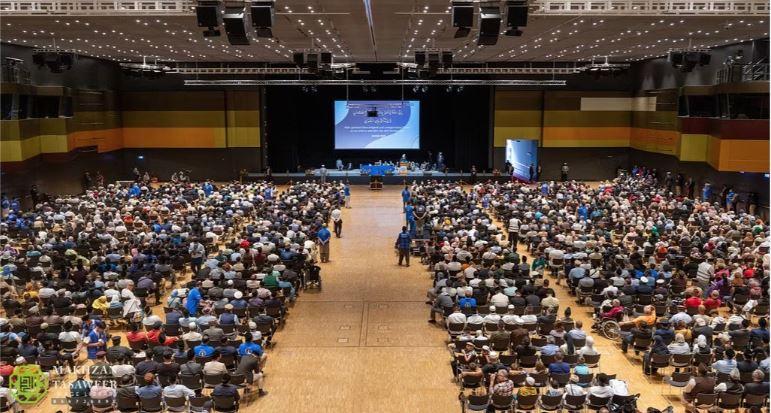
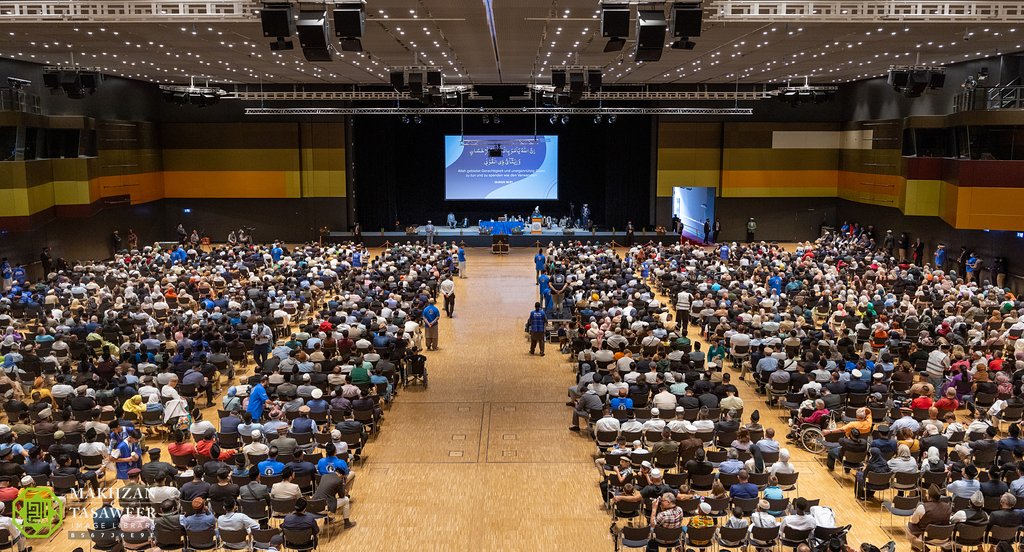
“Islam does not permit Muslims to propagate their faith coercively through the abhorrent and destructive power of swords, bombs or guns but instead calls on them to use reason, evidence and love to win the hearts and minds of mankind.” – Hazrat Mirza Masroor Ahmad
On 2 September 2023, the World Head of the Ahmadiyya Muslim Community, the Fifth Khalifa (Caliph), His Holiness, Hazrat Mirza Masroor Ahmad addressed an audience of more than 880 dignitaries and guests on the second day of the 47th Annual Convention (Jalsa Salana) of the Ahmadiyya Muslim Community in Germany.
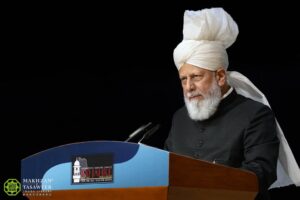
During his address, Hazrat Mirza Masroor Ahmad comprehensively addressed and refuted major allegations commonly levelled against Islam such as those relating to wars in early Islam, integration of Muslim immigrants and the status of women in Islam.
His Holiness also used his address to condemn in the strongest terms recent incidents of burning the Holy Quran in Europe.
Hazrat Mirza Masroor Ahmad presented chapter 10, verse 100 of the Holy Quran which states:
“And if thy Lord had enforced His will, surely, all who are on the earth would have believed together. Wilt thou, then, force men to become believers?”
Hazrat Mirza Masroor Ahmad explained that if God so desired, He could have compelled all people to accept Islam, “however, He determined that human beings would have free will,” denoting that it was impossible for the Holy Prophet Muhammad (peace and blessings of Allah be upon him) to violate the foundation of freedom of belief.
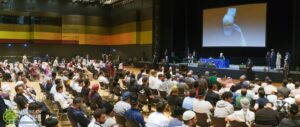
Hazrat Mirza Masroor Ahmad explained the correct method of propagating Islam and stated:
“Islam does not permit Muslims to propagate their faith coercively through the abhorrent and destructive power of swords, bombs or guns but instead calls on them to use reason, evidence and love to win the hearts and minds of mankind.”
During the address, His Holiness also referred to chapter 5, verse 9 of the Holy Quran, which states:
“Let not a people’s enmity incite you to act otherwise than with justice… Be always just, that is nearer to righteousness.”
Hazrat Mirza Masroor Ahmad referred to this verse as one that “defines the standard of justice advocated by Islam.”
His Holiness posed a question as to whether such upright standards of justice are being upheld elsewhere in international relations or in warring nations irrespective of the ruling government.
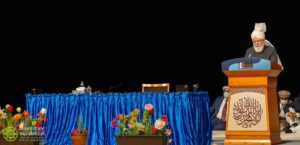
Hazrat Mirza Masroor Ahmad responded to this and stated:
“Only in Islam do we find such an unequivocal and peerless principle of absolute justice and it is a cause of great regret that even modern-day Muslim governments are failing to govern according to this Islamic standard.”
His Holiness addressed another oft-repeated false allegation that Islam is a religion of warfare.
Hazrat Mirza Masroor Ahmad emphasised and reiterated that God Almighty never gave Muslims free reign to fight or take up arms. His Holiness stressed that the Holy Quran only granted permission to do so “under extreme circumstances and with stringent conditions and restrictions imposed.”
His Holiness elaborated and explained how early Muslims had to endure unspeakable cruelties for many years at the hands of the non-Muslims in Makkah, so much so that they were forced to migrate to the city of Medina. The Meccans pursued the Muslims even in Medina and sought to eradicate Islam, other religions and all places of worship.
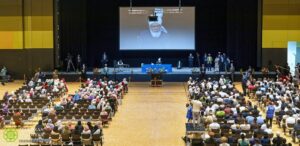
His Holiness stated that permission for Muslims to engage in a defensive battle was granted at this very juncture – “in order to establish the universal principle of freedom of conscience and belief.”
Commenting on radical ideologies falsely associated with Islam and the heinous attacks conducted by extremists in recent years, Hazrat Mirza Masroor Ahmad stated:
“Hateful extremists or those with political objectives have extrapolated entirely false conclusions from certain verses of the Holy Quran to serve their own evil desires and interests.”
Hazrat Mirza Masroor Ahmad further stated:
“If a person studies the proper context of those verses impartially, they will see that Islam does not permit any form of cruelty, and there are no contradictions within the Holy Quran or Islamic teachings.”
Hazrat Mirza Masroor Ahmad also emphasised that the Holy Quran “expressly prohibits Muslims from acts of rebellion or violating the laws of the land,” and added that “there is no question of a true Muslim being a threat to his nation or people.”

Thereafter, His Holiness spoke on the topic of the loyalty of Muslim immigrants to their newly adopted nations and said that as citizens, Muslims pledge loyalty and sincerity to the nation that has given them refuge. His Holiness mentioned how it is the religious duty of Muslims to uphold this pledge of being a law-abiding citizen and faithfully serving their nation.
Hazrat Mirza Masroor Ahmad stated:
“A well-known Hadith – saying of the Holy Prophet Muhammad (peace and blessings of Allah be upon him) – is that ‘love for one’s nation is a part of one’s faith.’ Given this, how can it be suggested that true Muslims are not loyal citizens or likely to sow seeds of division in society?”
His Holiness also expounded the true manner in which a Muslim ought to integrate into society.
Hazrat Mirza Masroor Ahmad stated:
“What can be a better form of integration than for Muslim immigrants to live with the heartfelt conviction that, though they were born elsewhere, they are now part of their adopted nation and stand ready to make great sacrifices for the sake of its prosperity? Hence, it is entirely wrong to assert that Islamic teachings are such that Muslims are incapable of assimilating into non-Muslim nations.”
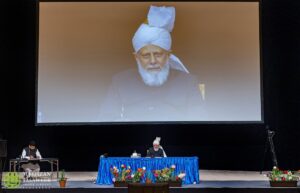
Hazrat Mirza Masroor Ahmad explained that adhering to religious commitments does not equate to failure to integrate into society nor does such diversity in society result in division or conflict.
Hazrat Mirza Masroor Ahmad stated:
“If, due to their religious convictions, a Muslim abstains from drinking alcohol, chooses not to go to nightclubs, dresses modestly or rejects behaviour that is contrary to their moral values, it does not mean that they have failed to integrate. Rather, I believe integration requires an immigrant to always seek the betterment of his adopted nation, to be ready for all sacrifices for it and to endeavour to serve his people with sincerity.”
Hazrat Mirza Masroor Ahmad stated this type of integration “will prove a means of enriching that society and strong bonds of unity will be forged amongst its citizens.”
His Holiness quoted chapter 51 verse 20 of the Holy Quran which states:
“And in their wealth was a share for one who asked for help and for those who could not.”
Commenting on the verse, Hazrat Mirza Masroor Ahmad said:
“Muslims should not wait for someone to ask for help but should proactively identify those in society who are in distress and help them overcome their challenges or troubles. Here where the Holy Quran says that some living beings cannot speak or assert their needs, it includes animals and other forms of wildlife. Some people think Islam discourages keeping pets or showing love to animals but this verse requires a Muslim to diligently care for animals under their supervision or care. Likewise, this verse also hints at the importance of wildlife conservation and protecting the world around us.”
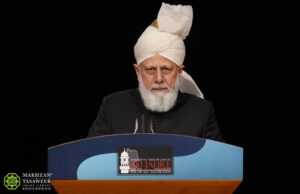
Thereafter, His Holiness alluded to another golden principle extrapolated from the Holy Quran which is to abstain from deriding or humiliating other nations or people and explained that mockery causes resentment which in turn shatters the peace of society.
His Holiness referred to the recent Quran-burning incidents in Sweden where certain individuals burned and vandalised copies of the Holy Quran and showcased this despicable act on social media, as well as the highly offensive caricatures of the Holy Prophet Muhammad (peace and blessings of Allah be upon him) that have been published in Europe.
Hazrat Mirza Masroor Ahmad responded to these heinous acts and stated:
“Our objection to such vile acts is not limited to those incidents in which only Islam or Muslims are targeted. Rather we firmly believe that denigrating what is sacred to the followers of any religion is reprehensible and to be condemned in the strongest terms.”
Hazrat Mirza Masroor Ahmad further stated:
“Such acts needlessly provoke and hurt innocent people and incite strong feelings of anger and resentment. They are a means of undermining the peace and cohesion of society.”
Before concluding the address, His Holiness addressed the question of women’s rights in Islam and shed light on the rights granted to women 1,400 years ago by Islam.
Hazrat Mirza Masroor Ahmad stated:
“Rather than deny women their rights, the truth is that Islam actually established women’s rights and did so centuries before similar rights were afforded by those nations that are now considered to be ‘progressive’. In an age when women’s rights were not even deemed worthy of consideration, the Holy Quran and the Holy Prophet of Islam (peace and blessings of Allah be upon him) enshrined forever countless rights of women and girls, including the right to education, to divorce and to inherit.”
His Holiness presented an analogy of the Holy Prophet Muhammad (peace and blessings of Allah be upon him) where he gave the simile of a ‘rib’ to showcase that they must be treated kindly and that they are fundamental to the survival of humanity just as the ribs serve to protect the vital organs.
Furthermore, on the topic of women’s domestic rights, His Holiness referenced chapter 4, verse 20 of the Holy Quran, which specifically instructs Muslim men to treat their wives lovingly and to be considerate of their needs.
Hazrat Mirza Masroor Ahmad stated that this verse “stipulates that women are free individuals and cannot be forced into the possession of any man.”
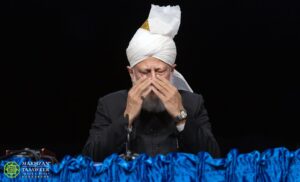
Hazrat Mirza Masroor Ahmad further stated:
“In terms of their finances, whatever a woman earns is hers to keep and her husband cannot demand a share. Upon divorce, Islam teaches that women are free to keep whatever their husbands gave them during their marriage.”
His Holiness explained that in today’s world, protracted conflicts and bitter disputes come to rise when a marriage breaks down and men seek to recover what they have given to their wives, however, Islam does not permit this.
In the end, Hazrat Mirza Masroor Ahmad reiterated that the allegations levelled against Islam are all without foundation and said:
“It is wholly wrong for Islam to be brandished as a religion of violence or extremism or to claim that Islam’s moral values are lacking in any way… On the contrary, it is a religion that seeks to build bridges among people of all faiths and beliefs.”

